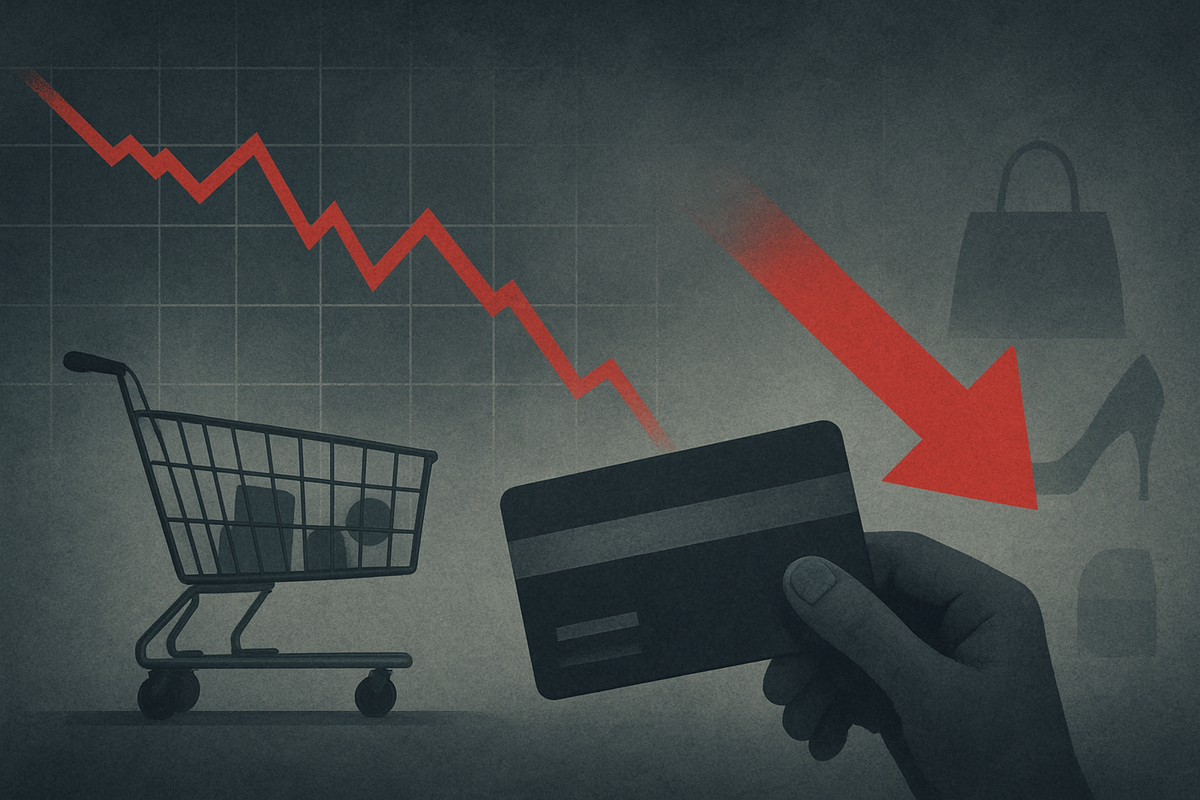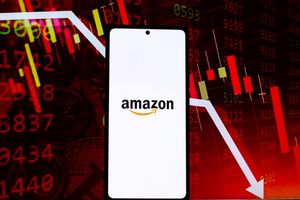
As of November 18, 2025, the S&P 500 Consumer Discretionary Sector appears to be navigating a challenging hypothetical landscape, marked by a broad "stocks selloff" that has sent ripples through the market. This simulated downturn, characterized by a notable decline in major components such as Amazon (NASDAQ: AMZN), signals a potential erosion of consumer confidence and a cautious economic outlook. The sector, a bellwether for consumer spending and economic health, would be particularly vulnerable in such a scenario, reflecting investor anxieties about discretionary expenditures in a tightening economic environment.
The Hypothetical Downturn: A Closer Look at Market Dynamics
In this hypothetical scenario for November 18, 2025, a generalized "stocks selloff" would likely be driven by a confluence of factors, such as escalating inflation concerns, hawkish central bank policies, or geopolitical uncertainties. Investors, in a flight to safety, would rotate out of growth-oriented and economically sensitive sectors like Consumer Discretionary. This sector, encompassing companies that sell non-essential goods and services, is highly susceptible to shifts in consumer sentiment and purchasing power. When economic anxieties mount, consumers typically curtail discretionary spending, directly impacting the revenues and profitability of these companies.
The hypothetical decline of giants like Amazon (NASDAQ: AMZN) would be particularly impactful due to its significant weighting within the Consumer Discretionary Sector and the broader S&P 500. A downturn in Amazon's stock would not only drag down the sector average but also reflect broader concerns about e-commerce growth, advertising revenue, and cloud computing demand (AWS), which can also be indirectly affected by a slowdown in business spending. The timeline leading up to such a selloff could involve a period of sustained high interest rates, disappointing earnings reports from key players, or negative economic indicators, collectively building a narrative of impending recession or prolonged economic stagnation.
Potential Winners and Losers in a Hypothetical Bearish Climate
In a hypothetical market selloff affecting the Consumer Discretionary Sector on November 18, 2025, several types of companies would experience significant pressure. High-ticket discretionary items such as luxury goods manufacturers, automotive companies (e.g., Tesla (NASDAQ: TSLA)), and travel and leisure operators (e.g., Marriott International (NASDAQ: MAR)) would likely see reduced demand as consumers prioritize essential spending. E-commerce platforms, including Amazon (NASDAQ: AMZN) and Etsy (NASDAQ: ETSY), while integral to modern retail, could also face headwinds from decreased consumer spending and potentially higher operational costs. Companies reliant on advertising revenue, often tied to consumer spending, might also see a downturn.
Conversely, in such a climate, some sub-sectors or companies might exhibit more resilience, although within the Consumer Discretionary Sector, "winners" are generally harder to find during a broad selloff. Discount retailers or value-oriented brands might fare comparatively better as consumers trade down. However, the overarching trend would be one of contraction across the board for companies whose business models depend heavily on robust consumer confidence and disposable income. The key impact would be on profitability margins, investment in future growth, and potentially workforce reductions as companies attempt to weather the storm.
Broader Implications of a Hypothetical Dip in Consumer Confidence
A significant downturn in the Consumer Discretionary Sector on November 18, 2025, would carry wider significance, serving as a potent indicator of eroding consumer confidence and broader economic weakness. This event would fit into a trend where households, facing economic uncertainties, tighten their belts, leading to a ripple effect across the economy. Reduced consumer spending directly impacts retail sales, manufacturing orders, and service sector activity, potentially slowing down GDP growth.
The potential ripple effects could extend to employment figures, as companies within the sector might freeze hiring or even initiate layoffs to cut costs. This, in turn, could further dampen consumer confidence, creating a negative feedback loop. From a regulatory or policy perspective, such a selloff might prompt calls for government intervention, such as fiscal stimulus or adjustments to monetary policy, to bolster demand and stabilize markets. Historically, similar periods of significant decline in consumer discretionary spending, often preceding or coinciding with recessions, highlight the sector's role as a leading economic indicator. Comparisons could be drawn to the dot-com bubble burst or the 2008 financial crisis, where discretionary spending plummeted, signaling deeper economic troubles.
Navigating the Hypothetical Road Ahead: Short-Term Volatility, Long-Term Strategy
Looking ahead from November 18, 2025, a hypothetical selloff in the Consumer Discretionary Sector would likely usher in a period of heightened short-term market volatility. Investors would be closely scrutinizing economic data, corporate earnings, and central bank communications for any signs of stabilization or recovery. Companies within the sector would need to consider strategic pivots, focusing on cost efficiencies, optimizing supply chains, and potentially shifting product mixes towards more essential or value-driven offerings. Digital transformation and leveraging data analytics to understand evolving consumer behavior would become even more critical.
Long-term possibilities include a restructuring of the retail landscape, with financially stronger companies potentially acquiring distressed assets. Market opportunities could emerge for contrarian investors looking for undervalued assets, while challenges would include navigating reduced consumer demand and intense competition. Potential scenarios range from a swift "V-shaped" recovery, should economic conditions improve rapidly, to a prolonged "L-shaped" stagnation if underlying economic issues persist. The adaptability of businesses and the responsiveness of policymakers would be key determinants of the ultimate outcome.
A Hypothetical Wake-Up Call: Assessing the Long-Term Impact on Consumer Discretionary
In summary, a hypothetical market selloff impacting the Consumer Discretionary Sector on November 18, 2025, would serve as a significant wake-up call regarding the fragility of consumer confidence and its profound influence on economic stability. The sector's sensitivity to broader economic trends, exemplified by the hypothetical decline of major players like Amazon (NASDAQ: AMZN), underscores its role as a crucial barometer for the overall health of the economy.
Moving forward, investors would need to closely monitor key economic indicators such as inflation rates, employment figures, retail sales, and consumer sentiment surveys. They should also pay attention to corporate earnings reports from leading discretionary companies, looking for insights into demand trends and management's outlook. The lasting impact of such an event could be a re-evaluation of growth strategies within the sector, with a greater emphasis on resilience, diversification, and understanding the evolving psychology of the consumer in an uncertain economic climate.
This content is intended for informational purposes only and is not financial advice. Please note: The market data and events described for November 18, 2025, are hypothetical, as real-time future market performance cannot be predicted or accessed. The article discusses potential market dynamics based on the user's prompt.





